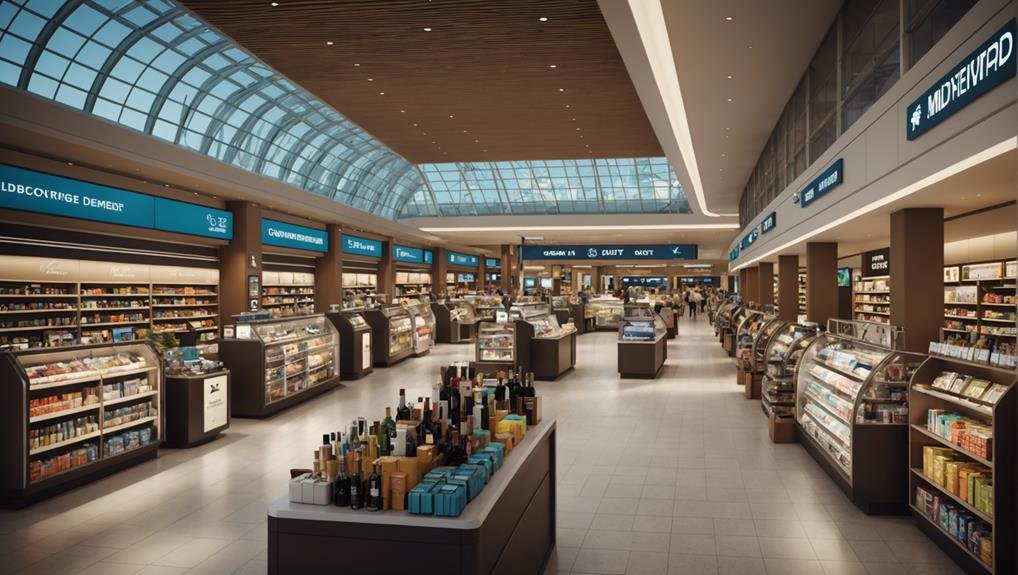What Does Duty-Free Mean, and How Can It Save You Money?
Duty-free shopping enables travelers to buy goods without paying import duties or taxes, providing significant savings on luxury and high-ticket items. This cost-effective shopping method offers cheaper prices for various products, including exclusive items not commonly found locally. Maximizing duty-free allowances, understanding limits, and researching in advance can lead to strategic purchasing, ensuring compliance and avoiding penalties. By monitoring currency exchange rates and focusing on high-value items, shoppers can make the most of duty-free savings. The financial benefits and convenience of duty-free shopping make it a smart choice for savvy travelers looking to make the most of their purchases.
Key Takeaways
- Duty-free shopping excludes taxes, offering lower prices.
- Duty-free limits vary by country and product type.
- Maximizing allowances saves money and avoids penalties.
- Tax-free shopping on luxury goods and exclusive items.
- Strategic planning and research lead to financial savings.
Understanding Duty-Free Shopping
Duty-free shopping offers travelers the opportunity to purchase goods without the burden of import, sales, or value-added taxes under specific conditions. Duty-free prices are lower as they exclude these taxes, making items like liquor, chocolate, and perfume more affordable.
However, duty-free limits exist, restricting the quantity of items that can be purchased without taxes. These limits vary by country and product type, with personal exemptions ranging from $200 to $1,600. Travelers must adhere to these limits to avoid additional taxes upon returning home.
Understanding duty-free prices and limits is essential for maximizing savings and complying with regulations when engaging in duty-free shopping.
Duty-Free Regulations Around the World
Understanding the diverse duty-free regulations across the globe demands a keen grasp of each country's specific customs policies and limitations.
- Duty free customs may include restrictions on alcohol content or the types of products that can be brought in.
- Duty free limits dictate the maximum quantity or value of duty-free items allowed per traveler.
- Some countries have strict regulations on specific items like tobacco or luxury goods.
- Duty-free purchases must adhere to the guidelines set by each country to avoid penalties or confiscation.
- It is essential for travelers to research and understand duty-free regulations before making purchases to guarantee a smooth and compliant shopping experience.
Maximizing Duty-Free Allowances
Maximizing duty-free allowances necessitates a strategic approach to optimizing one's tax-exempt shopping benefits while adhering to international regulations. To make the most of duty-free shopping, travelers should be aware of duty-free limits and implement effective duty-free strategies. Below is a table outlining key points to take into account:
| Aspect | Description | Importance |
|---|---|---|
| Duty-Free Limits | Understanding the maximum allowances for duty-free items based on destination and residence country. | Ensures compliance and avoids penalties. |
| Duty-Free Strategies | Researching in advance to identify the best deals, comparing prices, and planning purchases accordingly. | Helps in saving money and getting desired items. |
Benefits of Duty-Free Shopping
When considering international travel, exploring the advantages of indulging in duty-free shopping reveals a world of financial benefits and exclusive offerings for discerning travelers.
- Duty free discounts on luxury goods and upscale tourist items
- Tax free shopping, saving on import, sales, and value-added taxes
- Exclusive access to items not easily found in local markets
- Opportunity to purchase high-quality products at reduced prices
- Convenient packaging for travelers to take purchases with them seamlessly
Financial Savings and Duty-Free Shopping
An analysis of financial savings through duty-free shopping reveals a strategic approach for travelers seeking value and quality in their international purchases. When considering currency exchange rates, it's essential for travelers to monitor fluctuations and make purchases when their home currency is strong against the local currency.
Implementing effective shopping strategies, such as researching prices beforehand and focusing on high-ticket items like electronics or designer goods, can maximize savings. By taking advantage of duty-free shopping, travelers can avoid import duties and taxes, resulting in cheaper prices for a variety of products.
These savings can be significant, especially when buying luxury items or goods with high markups in domestic markets.
Considerations for International Travel
Considerations for international travel encompass a myriad of factors that impact a traveler's experience and financial decisions while journeying abroad.
- Currency conversion plays an essential role in budgeting for expenses in different countries.
- Budgeting wisely guarantees financial stability throughout the trip.
- Emergency coverage is crucial, and understanding insurance options can provide peace of mind during unforeseen situations.
- Having adequate insurance coverage can prevent financial burdens in case of medical emergencies or trip cancellations.
- Researching and selecting the right insurance plan tailored to international travel needs is important for a worry-free journey.
Additional Financial Tips
To enhance financial preparedness for international travel, exploring additional financial tips beyond insurance considerations can provide travelers with a thorough approach to managing expenses and potential unforeseen costs.
Budgeting strategies play an important role in controlling expenditures while traveling. Setting a daily spending limit and tracking expenses can help prevent overspending. Effective money management involves exchanging currency at favorable rates, avoiding unnecessary foreign transaction fees, and understanding duty-free shopping benefits. Prioritizing discretionary expenses and distinguishing between needs and wants can contribute to a balanced budget.
Additionally, considering Medicare coverage for international travel and obtaining thorough travel insurance can offer financial protection in case of emergencies. By incorporating these financial tips, travelers can optimize their budgets and enjoy a more financially secure international trip.
Conclusion
In the maze of international travel, duty-free shopping acts as a beacon of financial respite, offering a path towards savings and indulgence. Symbolizing the intersection of commerce and convenience, duty-free stores beckon travelers with promises of reduced prices and exclusive offerings.
By understanding the regulations and maximizing allowances, individuals can access the treasure trove of savings that duty-free shopping provides. In this economic landscape, duty-free shopping emerges as a symbol of savvy consumerism and strategic financial planning.







